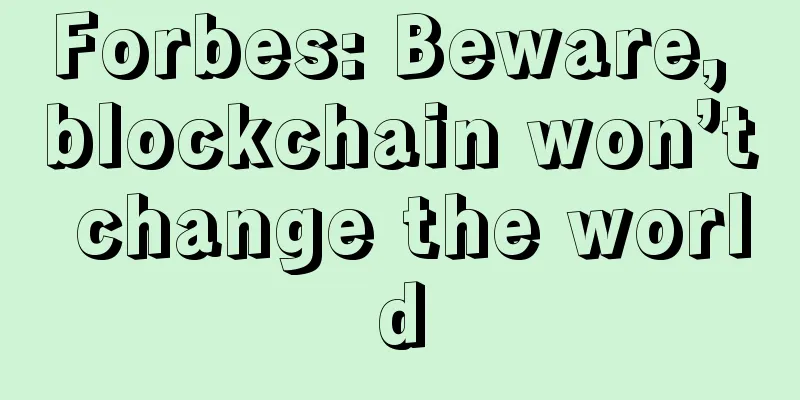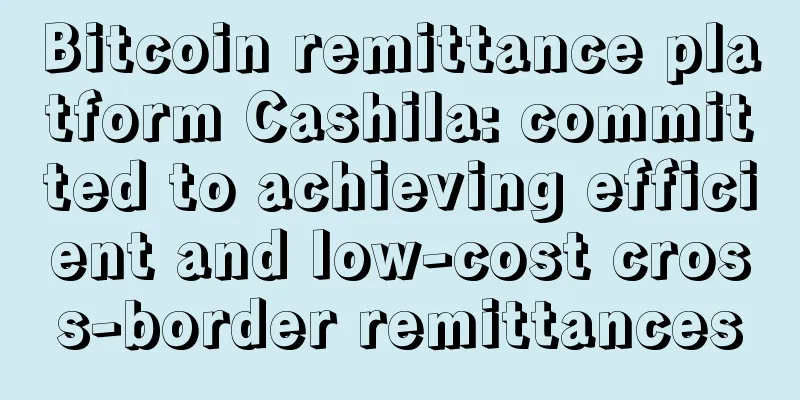Forbes: Beware, blockchain won’t change the world

Translation: Nicole By Frances Coppola I’m tired of the hype surrounding blockchain. It’s not high tech, it’s not revolutionary, it’s not that smart, and it’s not going to change the world. Anyone who works in payment systems — like me — knows that payment systems consist of two important parts: a ledger and a way to receive information. In a minimalist world, that’s all a payment system would need. The rest of the complexity of payment systems comes from imperfect networks, asymmetric information, and — most importantly — the need for protection against human fraud and human error. Blockchain is a simple payment system that consists of a distributed ledger and peer-to-peer messaging. OK, so the private key feature is smart — although it has its problems. But protected messaging services are also critical, and this isn’t rocket science. To illustrate this point, let me imagine a basic face-to-face human transaction using old-fashioned cash or, even more old-fashioned, gold coins. So, I go to the market to buy a sword. (I love Game of Thrones), I haggle with the seller, and we finally agree on a price. We shake hands, I give the seller the gold, and then I own the sword, so what is the payment system in this transaction? First, there are two ledgers, one registering coins and the other registering swords. (Did you know that the “suits” in a deck of cards are ledgers? Two of the four suits in Italian playing cards are coins and swords.) Second, there is a lot of information covered, and the exchange involves more than just swapping. At the beginning of the transaction, I have some coins in my wallet, and he has a sword, but no coins. For the purposes of this discussion, we will ignore the ledger function of the sword, although this is also a way to measure assets. If a sword is tradable, it is an asset - a store of value. But as with the Italian card game Scopa, coins are the way we really want to measure assets. Bargaining doesn’t affect the balance of our ledger, but it does affect the message we convey. We are establishing a trust relationship, and if we don’t trust the other person — for example, if the seller doesn’t think the coin is worth enough, or if I suspect the sword is stolen (i.e., I think the real owner might claim it) — then the deal won’t happen. When the currency is issued by a trusted institution, the need for personal trust is reduced: If the seller believes the currency is valuable, he might agree to sell the sword even if he suspects I’m a jihadist. (I’m not advocating this, by the way). But even so, he won’t hand over the sword until he’s sure I have the funds to pay. And I’ll only buy the sword if I really want it and I’m very happy with it — so I need to see it and consider its quality and value. All of this seems very complicated, doesn’t it? The blockchain doesn’t have to be that complicated at all. It only needs to record the last transaction and, in the future, possibly the transfer of ownership of the sword. The rest is all negotiation between humans and, of course, marketing. Never forget marketing. In my example of the sword and the coin, the transaction was instantaneous: I paid the money, and the seller gave me the sword. There was no delay. If all transactions were like this, there would be no need for middlemen. But of course most transactions are not face-to-face, they are long-distance transactions. The two parties may not have met in person, and the way they establish trust may be through third parties such as guarantors and credit rating agencies. All long-distance contracts, without exception, include a form of letter of credit, simply because there is an inevitable delay between making a deal, receiving payment, and delivering the goods. Using a trusted third party such as a bank can reduce the risk of payment or delivery of goods. "Letters of credit" have revolutionized international trade. This is where blockchain adds value. Blockchain eliminates the problem of asymmetric information (you don’t know how much money I have in my wallet, and I don’t know how much you have). Since the realization of near-instant transfers, the payment uncertainty problem has been solved, thus enabling long-distance point-to-point transactions without intermediaries, greatly reducing the complexity and the cost of intermediary payments. It is no surprise that everyone has a great interest in blockchain, regardless of whether there is a corresponding digital currency for blockchain. But blockchain has not revolutionized payment methods. When I pay for the sword, I have less coins in my wallet and less balance in my wallet: I give the coins to the seller, he puts the coins in his wallet, and his wallet increases by the same amount. If I buy the sword with Bitcoin, the blockchain technology will deduct the Bitcoin from my wallet, which reduces my balance, and put the money in the seller's wallet, which increases his balance. The fact that I don't have to hand over the Bitcoin to the seller in person because the blockchain does it for me obviously simplifies the process of buying a sword from a seller in China, but it is not a revolutionary change. This doesn’t eliminate the need for trust, and I moderated a panel on Bitcoin and blockchain at a conference in Ireland in February. One of the panelists sent half a Bitcoin to another panelist, who asked, “Did you get that?” The other person replied, “Yes.” Why did the team member feel the need to ask the other party whether he had received half a bitcoin? Because - whether he discovered it or not - he did not fully trust the blockchain. He needed confirmation from the recipient for the transaction to be complete. Traditional payment messaging systems include confirmation of payment. Less traditional payment systems, including PayPal, also send corresponding emails when the transaction is completed. But blockchain enthusiasts believe that such payment confirmations are unnecessary. Trust blockchain technology, it will not let you down. Of course it will. No technology is completely secure. Among other things, blockchain has a serious capacity problem. Currently, transaction volume is relatively low, but the transaction rate is growing rapidly. When transaction volume increases, transaction speed will decrease, just like traffic. It is possible to travel 70 kilometers per hour at 4 am when the roads are clear, but it is impossible to reach this speed at 8 pm during the rush hour. When transaction speed decreases, payments are delayed and distrust in the technology increases. "Why hasn't my payment arrived yet? I thought it was instant. Did the blockchain lose my payment information?" Blockchain proponents cite Moore's Law as a way to ignore the capacity issues of blockchain. They may be right, but the trust issue remains. I doubt that mass adoption of blockchain will be possible without the added confidence of inefficiencies like payment confirmations, or a tracking device that lets you see your payment or shipment. If people know why delays occur and how long it takes to resolve them, they will be more tolerant. But more importantly, trust in blockchain technology does not eliminate trust in the people who use it. This is where the hype that blockchain will allow everyone to have their own "personal currency" falls apart. Hyman Minsky As Hyman Minsky said, "Anyone can create money: the question is whether it will be accepted." Why would you accept my personal currency? The function of money as a transaction intermediary is to circulate. But my personal currency cannot circulate. Even if I pay you with my personal currency through the blockchain, what good will it do you? You may be my friend, but my currency is only as good as my reputation to others, not just to you. What will happen in reality is that some people's personal currencies will be widely accepted, while other people's currencies will not be used. Do we really want the transaction intermediary to be determined by a beauty contest? Transparency encourages transactions because it reduces fraud. When you can see your customers' wallets, it's easier to know your customers. But it doesn't mean there's no regulation. You can look at my wallet, but you can verify the source of the content, you don't know if the currency is clean or not. Maybe I robbed a bank, or robbed a woman, how would you know that? Of course, you may not care. Some people believe that one of the benefits of blockchain is that it can circumvent intrusive regulation, such as "know your customer" and "anti-money laundering" controls. Some of these are criminals, others are just ordinary people - people who fall into this category include the "government is evil and fiat currency is a fraud" zealots who are an important part of the Bitcoin frenzy. I admire their human faith, but I worry that it is misplaced. Some people exploit others, that’s human nature. The fact is that no technology is immune to bad human habits. Blockchain is no exception, although it can improve payment systems (glamorous!) and has other potential use cases. But blockchain will not change the world, because the world is made up of humans, and humans will not change their nature. |
<<: As Brexit supporters increase, British people may abandon the pound and choose Bitcoin
>>: Bitcoin reaches $700, experts give 5 major factors
Recommend
Anti-fork strategies for DeFi products
Reposted from: Ethereum Enthusiasts Since publish...
Are people with moles on their cheekbones strong? How is your career?
As one of the traditional physiognomy techniques, ...
How to know your destiny from your thumb
Everyone's palm and face are different. The p...
Microsoft and Bank of America collaborate on blockchain trade finance platform to reduce operational risks for finance departments
Bank of America (BoA) and Microsoft announced tha...
The face that likes to stay in bed every weekend
The weekend is indeed a very suitable time to hav...
A must-read for miners: 8 tips to help you achieve long-term mining profits
Source: Hackernoon Translation|First.VIP Mining B...
Bitcoin mining difficulty reaches 16.55TH/s, a record high
According to BTC.com, the value of "digital ...
What does nose physiognomy indicate?
The five facial features on our face all have the...
What are the characteristics of a woman with good luck in life? There are many noble people around her.
In real life, everyone hopes to have good luck an...
How your hard-working life is formed by your face
Some netizens have raised the question of how to ...
Is it true that women with high foreheads tend to neglect their families?
Women with big foreheads are always more self-cen...
BCH is about to hard fork Bitcoin's "eldest grandson" is coming
Since November 2, BCH (Bitcoin Cash) has been lik...
Is it good to have a red mole on your career line?
According to the shape of the career line, we can...
Are moles accurate? Do they affect a person's fortune?
Moles are a physiological phenomenon that everyon...
It's so unfair, a router can also mine blocks? 12.5 bits mined
Suddenly, like a spring breeze, a small router ex...









